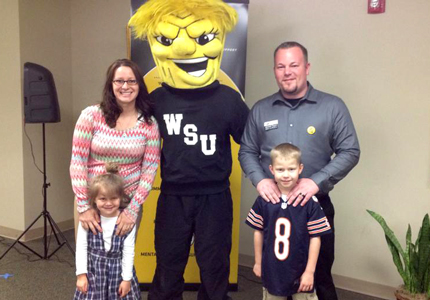Adversity is something many nontraditional students are familiar with, but Jeremiah Raymo has had to wade through more than his share to get where he is today. A 33-year-old father of two, Raymo received his master’s degree in social work from Wichita State University this May. His goal is to pay it forward, helping veterans like himself.
A native of Minnesota, Raymo enlisted in the U.S. Army right after 9/11. He started his military career as a crew chief in multiple launch rocket systems – box-like tanks armed with GPS-guided rockets. He was deployed to Iraq and retrained as infantry in 2004. As with many veterans deployed to combat zones, the experience was traumatic.
When he returned stateside, Raymo worked as an instructor at Fort Hood, Texas, teaching urban land navigation and large weapon systems. He served in that position for two years before an accident ended his career. The Army gave him a choice: They offered to pay him to get out or reclassify him to sit behind a desk.
“I wasn’t about to sit behind a desk at that point in my life,” he said. “So I took the money and an honorable medical discharge.”
Raymo returned home and took over the family business, then the third largest cast iron foundry in the country. But then the housing market collapsed, the business went bankrupt and he became unemployed.
Raymo was at a low point in his life, and was suffering from a culmination of including post-traumatic stress disorder, substance abuse and poor decision-making.
“I didn’t know what was going on with me,” Raymo said. “I had undiagnosed Post-Traumatic Stress Disorder (PTSD), and I actually ended up homeless for awhile. But I sought help – I listened to the supports that I had.”
Those supports included his wife, Jennifer, an Army captain, as well as social workers and psychologists.
“They were helping me learn to function in society,” he said, “but I didn’t realize until I was studying social work that they were helping me pay it forward, too.”
Back on track
When Raymo got his life back on track, Jennifer began to look into her options to transfer somewhere else. She came up with two choices: Fargo, N.D., or Wichita.
Raymo planned to be a stay-at-home dad for a while – an idea that lasted all of four months. That’s when he decided to take advantage of his military benefits and go to college. The plan was to pursue a degree in English Education, but Raymo soon realized he belonged in a helping profession instead.
“I took a class from Dr. Crews that class shifted a whole lot of my thinking,” he said, “I got to take a lot of cool classes, like animal therapy, bibliotherapy and a veterans course that taught me a lot about helping veterans as opposed to just being one. WSU and the School of Social Work create opportunities for students to learn.”
Raymo completed his undergraduate work while he was employed at Wichita State’s Center for Community Support and Research (CCSR). Raymo worked in the behavioral health initiatives field, training staff and helping build peer-run programs at community mental health centers around Kansas.
After graduation, Raymo decided to take his Wichita State experience further and follow the encouragement of both his practicum supervisor and his wife to pursue an advanced degree.
It was in graduate school that Raymo encountered another crisis, this time a medical one. Non-epileptic seizures put him in the hospital, where he was diagnosed with a brain tumor. Raymo missed a month of school during that time, but he managed to complete all his assignments.
“It was a very scary hurdle,” he said. “I wasn’t sure if I wanted to continue school, but I had great professors – Dr. Crews even visited me in the hospital. Others helped with my family. They showed that they cared about me as a person, not just as a student.”
Now healthy, Raymo is a graduate, and he’s already using his experiences – good and bad – to help others.
“Part of my illness was linked to my PTSD, from my experiences in Iraq,” Raymo said. “It was my past coming back to haunt me. But I overcame it, and here I am, graduating, looking at a bright future. And I have the people at WSU, my family and CCSR to thank for it.”


 Courtesy
Courtesy